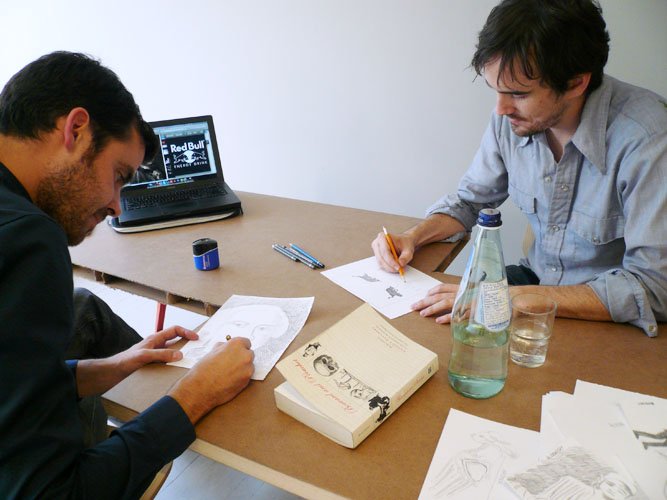40:books
on site review 40: the architect’s library
This issue had its origins in the early lockdown period, when either one no longer had access to libraries and books, or re-discovered one’s own library at home: forgotten books, books as biography, books not yet read, books not read for a long time – all of a sudden there was time to do so.
The relationship with books as material objects in the hand and books online in various formats is very interesting. There is an intense nostalgia for the time when any collection of books was a library – one cannot say the same of a collection of links and downloads. On the other hand, books are heavy, they occupy space many of us do not have, they require sitting down and actually reading indexes, reading pages, chapters, making notes. It is a slow consumption of ideas, not lightning flashes of connections firing through the internet.
If you are reading this, you are looking at a screen. If you’ve spent all day looking at a screen, remember, you can place an order for a print version of this issue: beautiful paper, high resolution images –- a thing of beauty, as always. Please choose your region, whether Canada, the United States or everywhere else, aka International:
For an explanation of our prices, please see onsitereview.ca/subscribe
some other thoughts on books and libraries, notes from another life:
books on holiday
R. de Salis, photographer. London Library book on vacation. August 2007, Morea, Greece.
Friday, June 17, 2011 at 9:52AM
Now here is a nice project. This enigmatic photo is of a book from the London Library, written by Patrick Leigh Fermor who recently died. The book is his 2003 Words of Mercury, which I gather in 2007 Fermor took on holiday to Morea in Greece.
In 1933 Fermor walked to Constantinople, carrying Horace's Odes and the Oxford Book of English Verse. During WWII and in the SOE he was posted to Crete and conducted wholly novelistic underground operations eventually made into a movie starring Dirk Bogarde. This is a kind of British life I'm not sure exists much any more – or at least isn't heroised in quite the same way as it was throughout the twentieth century.
Books on holidays: a chance to fade in the sun for a bit, a break from the dim stacks. And books do travel: a friend who had done his three year sentence at the University of Manitoba for his BES took a year out working on a fishing boat off the west coast. He arrived in London to start at the AA, carrying with him a Laurence Durrell book borrowed from the Vancouver Island Regional Library branch in Tofino. As my father was the director of this regional library system and used an honour-based borrowing system for all 30 branches (you didn't have a library card, you just signed your name; he came from a Patrick Leigh Fermor world) the arrival of this book in my one-up one-down in South Kensington was completely magical. I doubt it left London, Tony certainly didn't.
The book had returned to its site of publication, better travelled than most people.
pocket books
Wednesday, March 31, 2010 at 9:26AM
Victorian books were often very small, soft-covered and portable. The original pocket books, for the pocket. I once read that Leslie Stephen sometimes walked 40 miles in a day, books in his pockets, reading while he walked. I had a grandfather who would walk out with gun, dog and book across the prairie from the last street in Calgary, 18A SW, where he lived. He was born in 1875, came to Canada in 1908 bringing with him his violin, his patent-leather dance slippers, his school blazer and his Hardy fishing rod. Things were different then.
Books were one's companions in one's solitary pursuits. Books of poetry were high on the list, perhaps because poems then often had a walking rhythm, were episodic, compressed, gave one lots to think about. Wilfred Owen took his Keats to the Front in WWI.
We resist, today, being left alone with our thoughts – there is certainly a lot of stuff that rushes into the void, sort of as if we don't have any thoughts of our own really. Maybe we don't, but if my head is an empty desert I would prefer it be filled with Yeats or Heaney or Hughes. personally. Unfortunately I hardly have the time to stroll about, book in hand.
Gareth Long and Derek Sullivan: the illustrated dictionary of received ideas
Gareth Long and Derek Sullivan. The Illustrated Dictionary of Received Ideas.
Gustave Flaubert. Dictionnaire des Idees Reçues 1911-13
A dictionary of received wisdom: misguided, banal, what everyone thinks and never questions. In 1852 Flaubert wrote 'It would be the justification of Whatever is, is right'.
Jorn Barger in 2002 did an analytic reorganisation of the dictionary into broad categories such as 'things to make fun of' (Philosophy: always snigger at it), things to thunder against' (Whitewash (on church walls) Thunder against it. This aesthetic anger is extremely becoming). 'Things to pretend (Illusions: Pretend to have had a great many, and complain that you have lost them all).
The kind of person, or people, defined by this dictionary of admirable philistinism is familiar to anyone who has ever read a British novel about the class system but to find it so sharply defined in France is surprising when most of what we know of France is Proust (one must claim to have read it, a long time ago though), Sartre (did him in university – brilliant), de Beauvoir (unrequited lover/feminist – really responsible for Sartre's success) — this is catching, this received wisdom stuff. The clichés come so easily, they must be just below the surface.
Anyway, wouldn't have known about Flaubert's dictionnaire if I hadn't heard about Gareth Long and Derek Sullivan's ongoing project to illustrate the dictionary. They hold public drawing sessions, one of which was at Artexte October 2010 and another is today, June 1, 2011 at the Art Gallery of York University. They've built a special desk to do these drawings on, taken from Flaubert's last and incomplete book, Bouvard and Pécuchet, so we are looking at a large project, part performance, part book making, for there are books, small, that come out of this – one is published by Artexte, others in smaller editions from other venues.
Flaubert on what everyone knows about architects: Architectes --- tous imbéciles. --- oublient toujours l'escalier des maisons.
Gareth Long and Derek Sullivan. Illustrated Dictionary of Received ideas. here- Antiques: Are always of modern fabrication. Antiquities: Commonplace, boring.
Andrew Piper on lists
Dimitri Nabokov, note included in The Original of Laura (Knopf 2008)
Andrew Piper's essay 'Media and Metamorphosis: on notes and books' in the new everyday, a media commons project talks about the notes made by writers as they organise a novel, or a poem cycle – anything complex that moves from idea to what is eventually published. The fact that marginalia is a genre, that the notes themselves are a significant narrative, changes the way one thinks of the book. It isn't just the narrative between two covers, but a book is just one piece of a much larger story that occurs in many forms, not least the act of writing itself.
Nabokov's list, above, of synonyms for removing something has one phrase completely scribbled out as if it offended him. This isn't a list of possibles, a to-do list, rather it is a list of rejections. Above all, it takes the words that moil around in the brain and makes them visual. And once they are visual, they can be considered.
Goethe's list of keywords, the framework for Novella, is a map, with each country crossed off as he passed through it.
Goethe- und Schiller-Archiv, collection number 25, signature W 1990
Stan Barstow
Stan Barstow, 1928-2011. author
Thursday, March 14, 2013 at 8:10AM
I came across this photo of Stan Barstow whilst tracking down something else. Looking like a young Orwell, he actually was the author of A Kind of Loving, published in 1960. He was born in 1928, thus the officer's moustache which he was too young to qualify for. This is, perhaps, one of the things that made that generation angry. They couldn't help being born in 1928 and so being only 17 when WWII ended – they'd missed it all. And angry they were, John Osborne, John Braine, Alan Sillitoe, Britain's 'angry young men' writing in the late 1950s, gritty portrayals of postwar northern urban life that cracked the tin ceiling of the working class.
I'd read these books, because my father was a librarian and they were all around the house, and then in the early 1960s they were all made into films – black and white, wonderfully bleak, The Loneliness of the Long Distance Runner, Room at the Top, A Taste of Honey – all seen in grade 8 or 9 at the Capitol Theatre in Nanaimo. I fell for it all like a ton of bricks, as they say. Profoundly passionate, hopelessly romantic within the tough strictures of working class morés; clearly I wasn't reading Virginia Woolf – that came in grade 10, nonetheless I absorbed it all, as a 14 year-old will do. It didn't have anything to do with a life in Canada, but that's the thing about reading books, one is transported. Completely.
Thinking of re-reading Barstow, I find the Calgary Public Library which lauds itself for being the most active in the country, has none of his books.








